An economic check-in after one year of interim govt
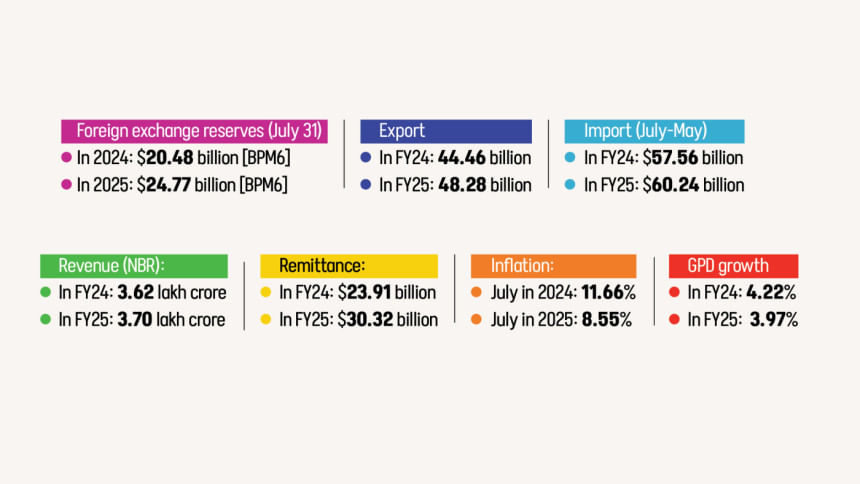
1 Year of interim rule
One year into its tenure, the interim government has a record of stark contradictions. While it successfully pulled the economy back from the brink of collapse, it has profoundly failed to restore the confidence of investors, leaving the economic future in a state of vulnerable uncertainty.
The administration can point to clear successes. It reduced the rampant corruption of the previous regime, stopped the freefall of foreign exchange reserves, and bolstered inflows of remittances through tighter financial monitoring. Stubbornly high inflation has also begun to ease. However, a deep crisis of confidence is crippling the economy. Both economists and business leaders agree that the investment climate is bleak. Private investment has stagnated, with credit growth dropping to a multi-year low and imports of capital machinery declining. This has led to slowing industries and rising unemployment.
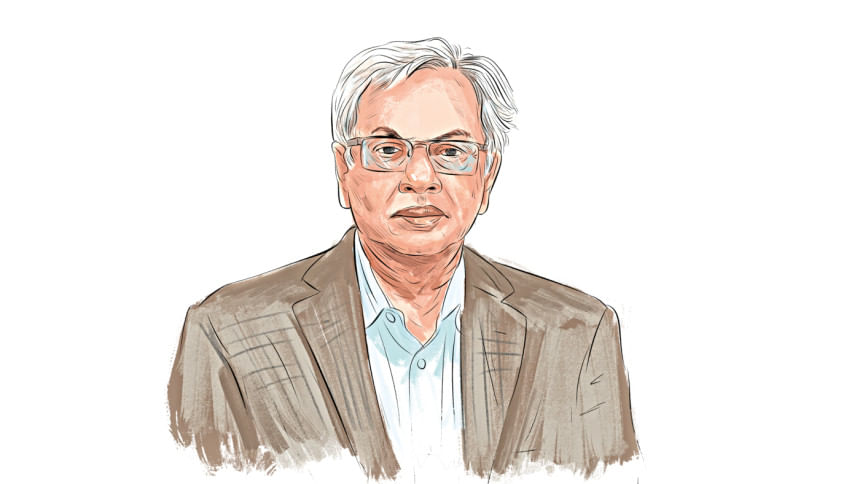
Unrealistic to expect all reforms from interim govt
Says BIDS Director General AK Enamul Haque
Ahsan Habib
Expecting an interim government to fix all the long-standing economic ills is neither realistic nor achievable, according to AK Enamul Haque, director general of the Bangladesh Institute of Development Studies (BIDS).
"It is not right to expect too much from an interim government, because long-term economic stability is not something that can be achieved during the tenure of such an interim setup," said the economist.
In an interview with The Daily Star marking the government's first year in office, Haque said, "We are seeing some changes in various areas. But people are saying change is happening slowly. They expect changes overnight, but it is not possible."
Haque said uncertainty usually holds back investment during transitional periods, which is exactly what the country is now experiencing.
"What we are hoping to see is the return of the rule of law. That is the big question. Its return is important," he said.
According to Haque, the interim government had a chance to move in the right direction, but may have overestimated what it could deliver in a limited timeframe.
"To evaluate the one year of the government fairly, we must look at the state of the economy they inherited," he said.
The BIDS DG said that the previous regime left a deeply corrupt and fragile system. "There was economic growth, but it did not have a sound foundation. Corruption was rampant, money was being laundered, and the banking sector was in serious crisis."
"Pulling the economy back from the brink was no small task. In that context, some progress has been made," he said.
However, setting aside the dire conditions of the past and looking only at GDP growth and investment over the past year, he admitted performance has fallen short.
There has been some improvement in the external sector, largely due to rising remittance inflows and curbed money laundering. These trends have helped build foreign exchange reserves.
"When the dollar was allowed to float and its price rose, remittances increased, which is expected," he said.
But corruption, he commented, has not declined.
"This is something that should concern everyone. Advisers are no longer involved in corruption like before. Yet, why has not corruption gone down?"
He suggested that one reason could be the unchanged nature of the bureaucracy.
"Nothing has changed there. The same people are in place, doing the same things," he said.
Haque added that although money laundering may have reduced, there has been no meaningful reform in the banking sector.
"If we want to reform private banks, a proper regulatory framework is necessary. And I do not believe that will be fully completed under the tenure of the interim government."
Still, he believes that laying the legal groundwork for reform is essential and possible.
He also commented that while banks are no longer giving out loans indiscriminately, borrowers are not stepping forward either. "If they do not understand the long-term economic outlook, no one wants to invest. That means not everything is in the government's hands."
With elections approaching, Haque expects the interim government now to focus on building the foundation for a fair economy.
"It is very difficult for such a government to carry out major economic reforms. It is not easy to reassure the private sector during the tenure of such a government," he said.
"Political governments assume office for a longer term, which gives them the confidence to make decisions. But now, all investors are sitting quietly."
Haque believes the primary goal of the current government should be to create an economic structure where fairness prevails, and no individual or group can manipulate the system for personal gain.
"The core idea behind reform was to set up the principle that if people play fairly, they will not be harassed. That is important. It is important for economic actors to understand that no one can violate their economic rights. This applies to businesses, banks -- all sectors."
Still, he pointed out, corruption and extortion continue. "Reducing corruption was a major part of economic reform, and work must be done in the areas where corruption happens. The Anti-Corruption Commission is working now. But to end corruption, efforts must be made in every corner."
With around six months left in its term, Haque said the interim government should focus on a few specific, achievable areas.
"If they can temper their expectations and work on a few specific areas, they should. At the very least, if they can build the foundation of reform, the next government will be able to carry it forward."
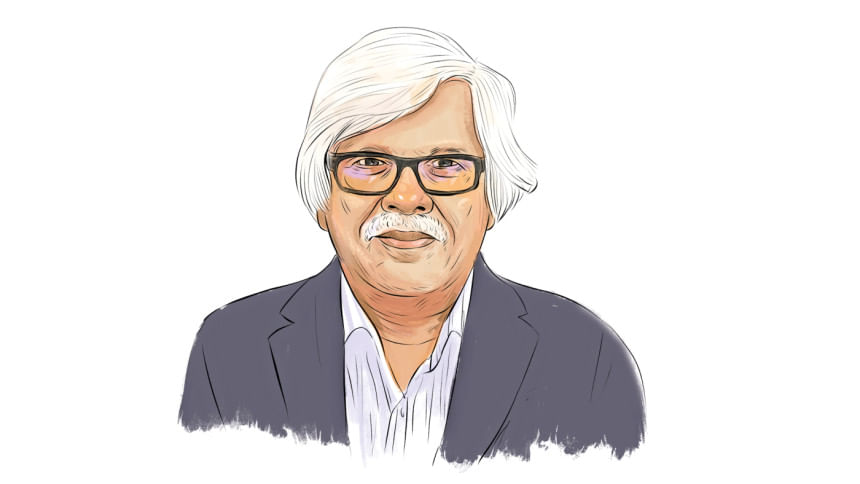
Investor confidence still fragile
Says BCI President Anwar-ul-Alam Chowdhury Parvez
Jagaran Chakma
The interim government has yet to restore investor confidence, leaving the economy on an uncertain and fragile footing, according to Anwar-ul-Alam Chowdhury Parvez, president of the Bangladesh Chamber of Industries (BCI).
He said the investment climate remained bleak throughout the past year due to political uncertainty, institutional dysfunction and policy decisions taken without consulting key stakeholders.
"Why would businesses invest when there is no policy predictability or institutional support? Costs of business are high, demand is low, interest rates are up, and even gas supplies are inconsistent. As a result, industries are slowing down, layoffs are rising, and unemployment is surging," he told The Daily Star in an interview marking one year of the interim government.
While he acknowledged improvements in some macroeconomic indicators, such as foreign exchange reserves and remittance inflows, he criticised the government for failing to deliver on its early reform pledges.
"The government came with the promise of reform, but so far, it has failed to bring any structural change," Parvez said. "One year is a long enough time to show intent, but the confidence crisis has only deepened."
The government took charge at a time when the economy was already under severe stress, recalled the BCI president.
"High inflation, volatile exchange rates, dwindling forex reserve, and widespread institutional failure had eroded public trust during the previous regime," he said. "But there was hope that the interim government would stabilise the system, restore law and order, and prepare for a credible election."
However, the political uncertainty has remained unchanged, and institutions like the judiciary, police, and regulatory bodies remain either inactive or under pressure, Parvez commented.
Inflation remains close to 9 percent, while both private and public investment have stalled, the BCI president said.
He said that private sector credit growth fell to 6.4 percent in June, below the 7.2 percent target set by the Bangladesh Bank.
Parvez argued that the central bank's cautious stance, aligned with recommendations by the International Monetary Fund (IMF), had slowed industrial productivity without ushering in genuine reform.
One area where he sees progress is in the banking sector, as he pointed to a rise in foreign reserves, greater stability in the currency market and improved monitoring of illicit capital flows.
"The remittance flow is rising again, thanks to tighter monitoring on money laundering," he said. "It is a big success for the government."
However, non-performing loans had reached a record Tk 4.20 lakh crore by March this year, raising serious concerns about long-term creditworthiness and access to international finance, he added.
According to Parvez, the government's failure to engage with business leaders and economists had been a major setback.
"Every household is connected to business in some way. You cannot make economic policy without involving businesspeople," he said. "This government has not sat with us. They are listening to a handful of bureaucrats and blindly following IMF guidelines without ground-level understanding."
The top chamber leader added that frequent bureaucratic reshuffles and confusion in decision-making had shaken morale within public institutions, further weakening governance.
According to him, until there is a political settlement and an elected government, investor confidence will not return. He believes the country is stuck in a prolonged phase of uncertainty, with no clear direction forward.
Parvez also criticised the interim government for what he described as the rise of mob culture, accusing it of failing to tackle such growing incidents.
Despite this disappointment, he gave credit to the authorities for enhancing oversight of financial channels, reducing illegal capital flight, and improving remittance flows through formal routes.
"This is a major structural step forward. If continued with integrity, it can help rebuild economic fundamentals."
He also acknowledged the government's success in stabilising the foreign exchange reserve.
Parvez said that while some technical improvements have been made, the wider economic outlook remains clouded by a lack of inclusive governance and political clarity.
"There is still time to course-correct. But time is running out," he concluded.
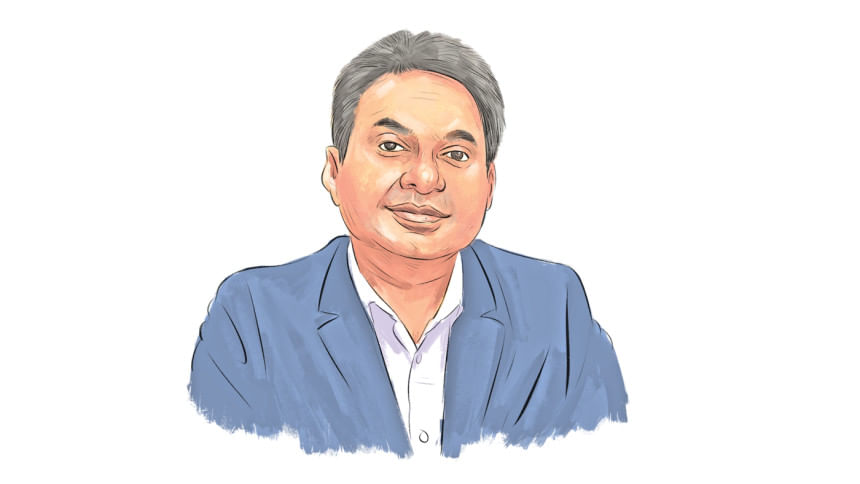
Economic gains miss reform momentum
Says economist Selim Raihan
Ahsan Habib
The interim government has managed to somewhat stem the bleeding of the economy over the past year, with rising exports and remittance inflows slowing the slide in foreign exchange reserves, according to Prof Selim Raihan.
The economist said the authorities have also curbed the widespread looting and corruption seen under the previous regime.
But political uncertainty has undermined business confidence, which in turn stifled job creation, said Raihan, executive director of South Asian Network on Economic Modeling (Sanem).
Besides, he criticised ministries for failing to draw up action plans that could have compelled the next government to pursue much-needed reforms after the election.
In an interview with The Daily Star on the first anniversary of the interim government, Raihan said, "Some progress could have been made over the past year. Now, looking back, I am not confident about the sustainability of the few successes we did see."
"I have mixed reactions on the performance of the interim government in the past year," said the economist, who also teaches economics at Dhaka University.
He acknowledged some successes, especially in export earnings and remittances, describing them as "reasonably good". Inflation, which had stayed stubbornly high, has begun to ease.
"But it would be wrong to say we are in a comfort zone," he said, pointing to high rice prices and the likelihood of renewed inflationary pressure in the upcoming months.
"Another positive side is that we have managed to halt the fall in foreign reserves, and they have increased slightly," he added.
In contrast with the previous regime, large-scale corruption and widespread plundering have been brought under control, he said.
Yet, a more serious problem lies in the government's failure to restore investor confidence. "Business confidence has not been restored," said Raihan. "As a result, investors, especially private ones, are still very apprehensive. They are not investing."
This sluggish investment scenario is reflected in the poor growth of private sector credit, which has remained among the lowest in recent years. Imports of capital machinery have dropped, the economist pointed out.
He attributed this to a combination of factors, including political instability. Sporadic incidents of mob violence throughout the year highlighted the government's struggle to ensure law and order.
He said this ambiguity has left investors uncertain, as they remain in the dark about the government's actual reform agenda.
"Will they continue the current practices, or bring major changes? This uncertainty is significant," said Raihan.
Investors look for stability and clear policy direction, along with a defined roadmap for political transition. In the past year, none of these have materialised, commented Raihan, as he believes this has had a knock-on effect on the overall business climate, including job creation.
Two major reports, the White Paper Committee Report and the Task Force Committee Report by the interim government, had aimed to kick-start reforms.
"But there has been little follow-up," said Raihan. "We have not seen any real initiative based on these reports or the reform measures they suggested."
The white paper was drawn up by a 12-member committee led by prominent economist Debapriya Bhattacharya, a distinguished fellow at the Centre for Policy Dialogue (CPD). A second 12-member taskforce on economic strategy was also formed, and Raihan served on both.
"Despite these efforts, reform remains piecemeal," he said. "There has been no clear drive or mobilisation in terms of reforms. Whatever the government has done is fragmented."
"What feels most painful is the unfulfilled promises of last August, that major changes were coming," Raihan added.
While he acknowledged that a year may not be enough to complete all reforms, he said the government could at least have launched the basic processes mentioned in the two reports.
"Ministries could have been instructed to prepare action plans. That would have at least pressured the next government to act," he said.
He also raised concerns about the national budget. "We all expected this year's budget to be somewhat different, especially with more allocation in health and education, and addressing the challenges faced by private investors," he said.
"But those expectations were not met."
Now, he fears the next administration may not pursue these reform measures seriously. "This is a major failure," he added.
There have been some tentative steps in the banking sector, but Raihan said a broader strategy was needed.
"A holistic approach was needed for banking sector reform," he said.
"But people do not know what changes are being made. A clear roadmap could have been presented to the nation, which would have built confidence in the banking sector."
"Instead, we have heard mixed messages. Sometimes five banks are said to be merging, sometimes six. The names of the banks involved keep changing."
"The whole process is non-transparent, so confidence in the banking sector could not be regained," he said.
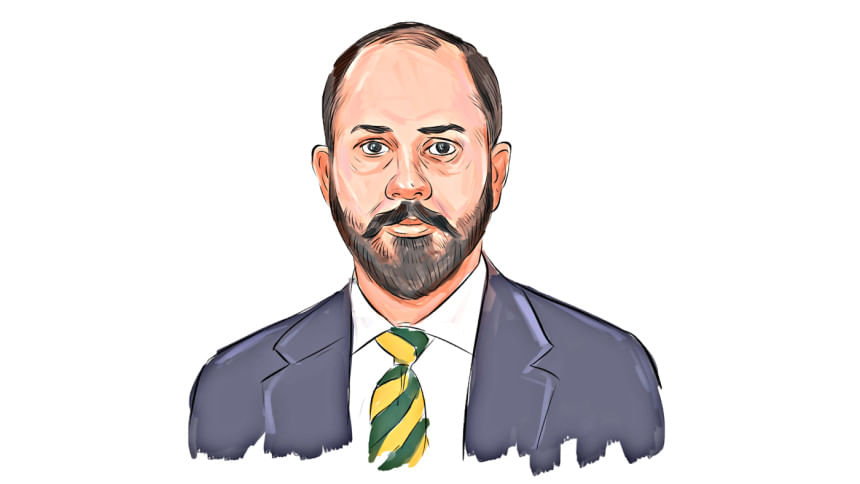
Govt should stop treating private sector as an enemy
Says former DCCI president Rizwan Rahman
Jagaran Chakma
Investor confidence has waned, private investment has slowed, and the disconnect between the private sector and policymakers has widened over the past year of interim government, said Rizwan Rahman, former president of the Dhaka Chamber of Commerce and Industry (DCCI).
He accused the interim government of treating the private sector not as partners, but as "suspects".
In an interview with The Daily Star marking one year of the government, the young entrepreneur said, "Anyone who prospered in the 16 years of the Awami League government is viewed with suspicion. That is not only unjust, it is damaging."
Rahman also pointed to governance issues, policy missteps, and a lack of direction, mentioning how the past year has affected the private sector and what needs to change urgently.
He said, "Yes, there have been some attempts at economic stabilisation. Reserves have slightly improved, exchange rate volatility has calmed, and inflation was temporarily managed during Ramadan. But these are cosmetic. The real issues lie deeper. Banking remains fragile, investor confidence has not returned, and the private sector feels alienated."
Rahman compared the current government to the 2007-08 caretaker government, which was formed to take care of state affairs for an interim period until the next regular government.
He said the key difference he finds is "collaboration".
"The last caretaker regime had its flaws, but they actively engaged with the private sector. They formed the Better Business Forum, met monthly with stakeholders, and ensured implementation tracking. This time? There is a complete disconnect."
The entrepreneur was critical of unilateral policymaking, which he said had become the norm.
"Whether it is the new insurance laws, capital market reforms, or digitalisation rules, these were drafted without consulting the industry. The results? Regulatory overlaps, legal ambiguities, and serious friction between the state and businesses," he commented.
Rahman also talked about the state of the banking sector.
"While known defaulters remain untouched, genuine entrepreneurs are forced to repay loans at 14 to 15 percent interest. Why are those who stayed, who continue to pay taxes, being penalised for others' wrongdoing?"
He noted that profits of listed companies had dropped sharply, with many reporting losses.
"How can you expect revenue growth when the business climate is so uncertain, policies keep changing, and lending conditions are stifling?" he asked.
He said foreign investors, too, were reluctant to enter the market.
"We are reporting inter-company loans as FDI. That is misleading. The reality is FDI is not coming in because they are seeing what we are seeing: inconsistency, opacity, and uncertainty."
Rahman said one of the government's gravest failures was the erosion of institutional justice.
"Selective law enforcement, politically motivated arrests, even threats to businesspeople who speak out, this climate is not conducive to entrepreneurship. If investors do not trust the system, they would not invest; it is very simple."
He criticised the government's tendency to host investment summits abroad while ignoring business leaders at home. "We organise flashy investment summits for foreign investors, yet we cannot invite our own business leaders properly."
Rahman believes the government could have gained broader support if it had been clearer about its objectives from the beginning.
"Had Muhammad Yunus clearly stated from the outset that he required two years to stabilise the country before holding elections, he likely would have secured broader public support. Instead, the absence of clarity and inconsistent messaging gradually eroded public trust," he commented.
"This government did not come to power through an electoral mandate, but through public expectation. With the promise to remain neutral, restore order, and ensure a smooth transition," Rahman said.
But with political pressure rising, he said that the time for meaningful reform was running out.
"If this government truly wants to regain public and business confidence, it must listen, include, and commit to an inclusive democratic process. That is the only way forward," he added.

 For all latest news, follow The Daily Star's Google News channel.
For all latest news, follow The Daily Star's Google News channel. 







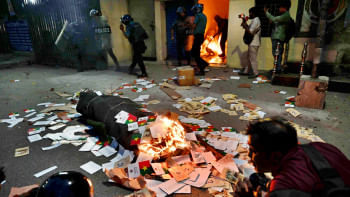
Comments